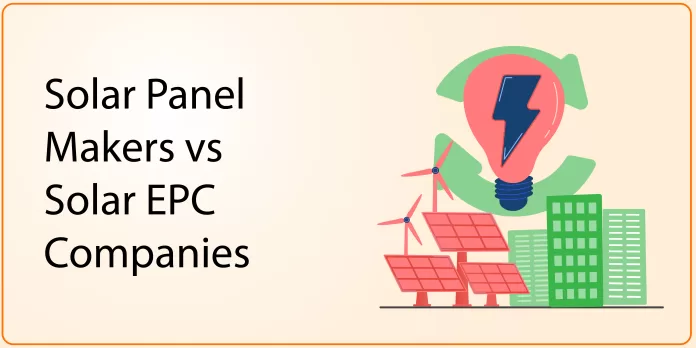India’s ambitious target of achieving 500GW of renewable energy by 2030, with a significant focus on solar and wind power, presents a lucrative opportunity for investors. However, navigating the regulatory challenges in the solar energy sector is crucial for making informed investment decisions. In particular, the dichotomy between investing in Solar Panel Makers and Solar EPC (Engineering, Procurement, and Construction) companies warrants careful consideration.
Solar Panel Makers vs Solar EPC Companies
In the short and medium term, both Solar Panel Makers and Solar EPC companies can be viable investment options, provided companies are chosen judiciously. However, the regulatory landscape significantly impacts the prospects of each.
Solar Panel Makers face the challenge of price volatility due to government policy interventions, akin to the challenges faced by the sugar manufacturing industry. Government incentives are offered to promote ‘Make In India,’ but this can result in subsequent control over selling prices, impacting profitability. The impending implementation of the Approved List of Models and Manufacturers (ALMM) in April 2024 adds a layer of uncertainty. If implemented, it could lead to a surge in share prices, but subsequent government interventions may cause a downturn.
Solar EPC companies, on the other hand, are poised for robust growth. With the government targeting 50GW of solar installations annually, these companies will play a pivotal role in project execution. Unlike Solar Panel Makers, EPC companies have minimal influence on solar panel prices or tariffs, making them less susceptible to regulatory interventions.
The Regulatory Conundrum
The government’s commitment to driving down solar energy tariffs, currently at under Rs.2.4/kWh, creates challenges for Solar Panel Makers. The lack of backward integration in the industry, with almost 90% of solar cells being imported, underscores the dependency on external factors. The government’s initiatives, such as the delayed implementation of AMML to curb solar module imports, highlight the delicate balance between promoting domestic manufacturing and ensuring competitive energy tariffs.
The Challenges of Backward Integration
The solar industry’s lack of backward integration is a significant hurdle. While industry giants like Adani and Reliance plan to manufacture Solar Ingots and Wafers, achieving commercial scale remains a formidable task. Until India achieves self-sufficiency in Solar Cells, Wafers, and Ingots production, solar panel manufacturers will remain reliant on imports, exposing them to regulatory risks.
Investment Opportunities
For investors eyeing the solar energy sector, it is essential to consider the regulatory challenges and market dynamics. Solar EPC companies, such as KPI Green, Oriana, and Waaree Renewables, appear to be relatively insulated from regulatory risks. Their role in project execution positions them favourably, irrespective of fluctuations in energy tariffs.
While Solar Panel Makers may experience price spikes with potential ALMM implementation in March 2024, the subsequent government controls could impact long-term sustainability. Investors in this segment should monitor regulatory developments closely and be prepared for potential market volatility.
Conclusion
The Indian solar energy sector presents promising investment opportunities, but careful consideration of regulatory challenges is imperative. Investors must weigh the risks and rewards associated with Solar Panel Makers and Solar EPC companies, keeping in mind the government’s commitment to achieving ambitious renewable energy targets. As the industry matures and achieves greater self-sufficiency, the investment landscape may evolve, offering new opportunities for those keen on contributing to India’s green energy revolution.
Read More:
- Decoding India’s Green Energy Landscape after COP28
- Top 10 Performers in Power Generation & Distribution sector
Disclaimer: This blog has been written exclusively for educational purposes. The securities mentioned are only examples and not recommendations. The information is based on various secondary sources on the internet and is subject to change. Please consult with a financial expert before making investment decisions.


